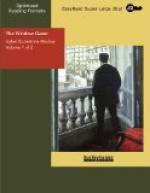“You can’t—you can’t care like that!” he said in a low, furious tone. “You said you never could!”
“I do,” said Desire.
It was the avowal which she had sworn she would never make. Yet she made it without shame. Love had taught Desire much since the day of the episode of the photograph. And one of its teachings had to do with the comparative insignificance of pride. Why should he not know that she loved him? Of what use a gift that is never given? Besides, as this leaden week had passed, she knew that, more than anything else, she wanted truth between them. Now, when he asked it of her, she gave him truth.
“It is breaking our bargain,” she went on with a wavering smile. “But I was so sure! I cannot even blame myself. It must be possible to be quite sure and quite wrong at the same time.”
“Yes. There is no blame, anywhere. I—I didn’t think of what I was saying.”
“Well, then—you will guess that it isn’t exactly easy. But I will wait as you ask me. When you are quite sure—you will let me go?”
“Yes,” he said.
Neither of them looked at the other.
Does Jove indeed laugh at lover’s perjuries? Even more at their stupidities, perhaps!
CHAPTER XXXII
For they really were stupid! Looking on, we can see so plainly what they should have seen, and didn’t.
If thoughts are things (and Professor Spence continues to argue that they are) a mistaken thought is quite as powerful a reality as the other kind. Only let it be conceived with sufficient force and nourished by continual attention and it will grow into a veritable high-wayman of the mind—a thievish tyrant of one’s mental roads, holding their more legitimate travellers at the stand and deliver.
Desire, usually so clearsighted, ought to have seen that the attentions of Benis to the too-sympathetic Mary were hollow at the core. But this, her mistaken Thought would by no means allow. Ceaselessly on the watch, it leapt upon every unprejudiced deduction and turned it to the strengthening of its own mistaken self. What might have seemed merely boredom on the professor’s part was twisted by the Thought to appear an anguished effort after self-control. Any avoidance of Mary’s society was attributed to fear rather than to indifference. And so on and so on.
Spence, too, a man learned in the byways of the mind, ought to have known that, to Desire, John was a refuge merely, and Mary the real lion in the way. But his mistaken Thought, born of a smile and a photograph, grew steadily stronger and waxed fat upon the everyday trivialities which should have slain it. So powerful had it become that, by the time of Desire’s arrival on the veranda, it had closed every road of interpretation save its own.




